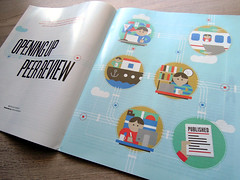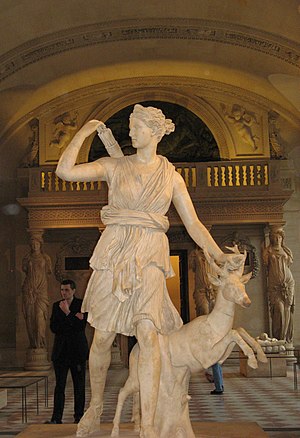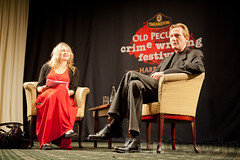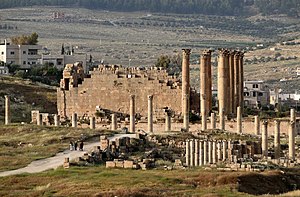This blog is meant to be used as an example for first-year composition students. Rhonda is a fictional community college student who will perpetually be taking the two-course sequence. This is her online writing and research journal (her 2012 research entries run from 1/20-5/5/2012; Eng101 reading journal that year runs from 8/22-12/5/12). For an explanation of the course, see below for Rethinking Teaching the Research Paper.
Monday, December 10, 2012
The Final Exam is TOMORROW (cue the ominous music)
Like I said last time, I already had two finals last week. They weren't too bad, and only one (political science) had any essay questions. I answered the one about systems and chose fascism to discuss, because I really remembered the class we spent on it. The interesting thing about the English exam is that it's on two different days; we're doing the essay question tomorrow, and our study guide actually gave us the entire question that will be on the test.
The last unit of the course was on writing exam essays, so giving us the question made sense, but I'm thinking now that it was kind of diabolical, too. All weekend long I was obsessing about it. According to the prof, the verb in the question is the key to answering it, and the verb in our question is "analyze," which, as it turns out, is the most difficult one. Actually, what we're going to do is sort of a mini version of a critical analysis. She gave us a three-page handout by Bruno Bettelheim about what fairy tales do in terms of childhood development and showed us a couple of fairy tales on video. We also read the Brothers Grimm version of Cinderella, which was a real surprise -- no fairy godmother, three balls, and her father is STILL ALIVE through the whole thing. That was the thing that convinced me that Bettelheim was right when he said that it's a story about sibling rivalry. The father goes along with whatever the stepmother and stepsisters choose to do to Cinderella.
The problem I'm having here, though, isn't with Cinderella, since that's not the story being used for the exam. I never even heard of the story on the test. It's The Three Ravens, and it's about a princess who swears not to speak for three years, three months, and three days in order to break the spell her evil stepmother put on her brothers (she turned them into ravens). A lot of things happen during the three years that test her ability to keep to her vow, but she doesn't give up and eventually breaks the spell (just as she's about to be burned at the stake for being a witch!). I can't make up my mind about what to do with this story, but I'll have to decide before noon tomorrow.
Overcoming Finals Week Frenzy . . . by thinking about grammar?
| Teenbeat Club, Las Vegas Nevada, Concert Promotion Flyer (Photo credit: Wikipedia) |
I don't know how other people feel about this, but I absolutely loathe fiction that is written in the present tense (for example, "Catherine can see a stand of trees behind the house"). I can't forget that I am reading and just lose myself in the story. It feels to me as if I'm hearing somebody discuss the story rather than telling it, and this is even more true now, after writing my critical analysis paper where we had to use what Toffee calls "the literary present tense." So, this was my problem with Granotier's book. It seemed like a critique of what I would call a real novel. All the way through I was debating whether or not I should give up on it, which doesn't make for a fun experience.
Strangely enough, the present-tense thing did not bother me much with The Hunger Games, once I started reading it. It was kind of obvious that Collins was using it because Katniss is the narrator and that meant that telling it in the past tense would eliminate any suspense about whether or not she survives in the end, but I'm not so sure that it would have mattered to most of the people reading it if the book had been in the past tense.
Related articles
- Should you write in present tense? (keystrokesandwordcounts.wordpress.com)
- Writing & Editing: Find & Correct Common Grammar Mistakes (mbweston.com)
- Are You Ready for Final Exams? (psychology.about.com)
- 6 Tips to Beat Final Exam Stress (collegecandy.com)
- Charge up your writing with vibrant verbs (prdaily.com)
Monday, December 3, 2012
Say It Ain't So! Not Tom Cruise as Reacher!
| Lee Child interview #04 (Photo credit: Fenris Oswin) |
So, you can see why I'm so disgusted by Tom Cruise in the role, right? You have a character who's really big, doesn't smile, doesn't talk, is supremely logical and self-deprecating, AND YOU CAST "Tiny" TOM CRUISE? A guy who has got to be the smuggest, talkiest, smiliest, most gullible, illogical actor ever -- and that's both in his public persona and his performances. I can't stand it. I'll stick to the books, and it looks like I'm not alone (see the articles below). One more thought: Nobody ever calls him Jack, just Reacher (even his own mother!). So why did the filmmakers, instead of using the title of the book, go with Jack Reacher for the title of the film? Did any of them read the books?
4 more to go (and, yeah, I'm reading the assigned stuff. It just isn't doing anything for me that I want to write about. I checked with the prof, and it's okay. So there.).
Related articles
- 'Jack Reacher' Featurette: Tom Cruise Gets Author Lee Child's Seal of Approval (screencrave.com)
- Character Assassination: Tom Cruise as Jack Reacher. (authorsofmainstreet.wordpress.com)
- Tom Cruise too short and clean-cut for tough guy giant in Jack Reacher, say fans (telegraph.co.uk)
Saturday, December 1, 2012
What's Epic About That?
| A pizza hut. The building is in Stratford-upon-Avon, Warwickshire, England. It is on the corner of Ely Street and High Street (Photo credit: Wikipedia) |
I was switching between the game and a Lifetime movie, and the commercials during the movie used "decadent" a lot. Didn't the Roman Empire fall because of decadence? I seem to remember that from Early World History when I was a sophomore in high school. So if decadence is bad, why pay money for it? Use these three words in a sentence, and you might get: "Try our decadent epic boxes o' carbs, and fill out your ridiculously scrawny figure." Maybe it's just me, but I wonder what words we'll have to use to communicate epic, ridiculously, and decadent, when that's what we mean.
Can you tell that I'm just trying to get all thirty of my entries done for my blog project in Eng 101? I need five more by midnight next Friday.
Related articles
- N. Illinois beats Kent State in thrilling MAC title game (cbssports.com)
- NIU coach emails Heisman voters about Jordan Lynch (rrstar.com)
Would You Care for Some Cheese with Your Whine?
| :- Fred (Photo credit: Rob Warde) |
There's a guy in my comp class who sits across the aisle from me, and spends half his time whining about everything, from how hard the assignments are to how the shades are pulled down on the windows. He has not taken any notes all semester. I did a peer review for him a while back, and I was really, really, really shocked by what he thought was a good paper. It stank on ice, as my uncle Gus would put it, and the guy -- I'll call him Fred -- was pretty pleased with his work. I'm not sure Fred ever reads anything he doesn't absolutely have to. For one thing, he's the Fragment King. Most of his "sentences" are missing either a subject or a verb, or they're just phrases.
So why am I writing about him today? Yesterday he was whining about his grade (finals are in 2 weeks) and how Toffee expects too much work (totally ignoring the fact that the school requires us to write a certain number of words for the course), and how she thinks we're actually going to revise stuff, and nobody does that for real, right? and HE WOULDN'T SHUT UP.
Toffee's up at the front of the room explaining how to write answers to essay questions on exams, and Fred is muttering to himself non-stop. I finally turned to him and shushed him like an old lady in church. You would've thought I slapped him. And, it turned out that I just made it worse. Now he was muttering AT ME. He got this kind of wounded look on his face, and said, "like any of this matters." Well, it matters to me, and I'm not just whining, I'm venting (the difference is obvious, isn't it?).
I should have changed my seat at the first whine, back in August.
Related articles
- Whine Busters - 8 Tips to Stop that Whining! (everydayfamily.com)
- The whiner's room (sethgodin.typepad.com)
- Writing, I've got to get back to you (run4joy59.wordpress.com)
Wednesday, November 28, 2012
I Coulda Been Somebody
 |
| The Wrong Version (Photo credit: Wikipedia) |
Got my big paper back yesterday, and as soon as I looked at it, I realized that I should have talked to the prof after I had a revision going. I knew something was wrong with it, but I couldn't tell what it was, and by then I was sick of looking at it, so I let it slide. Big mistake. Turns out it was my tone. As soon as I read her comment about the tone, I knew where I went wrong.
Waaaaaaahhhh! I could have had an A!
Related articles
- I Coulda Been A Star Too. (cuteoverload.com)
Monday, November 19, 2012
Something I Wish I Had Read-- Facebook Makes You Fat!
 |
| Facebook=a fatter you? (Photo credit: Wikipedia) |
I saw this story on AOL this morning; it was one of their unlabeled videos. These always irritate me, because I wouldn't bother clicking on them if I knew they were videos. I haven't got the time to sit through an ad and a bunch of small talk before they get to the point. Not to mention that they are always superficial. Gimme the written word. I can read at least 3 times as fast as they can talk.
Anyway, this story caught my eye: "Social Media Related to Weight Gain?" A recent study has made this connection, which I have been suspecting for a while. My friends who spend a lot of time on Facebook (especially Facebook!) all seem to be gaining weight, and this started in high school, so it's not the freshman fifteen thing.
I've been avoiding Facebook because it's so boring (aren't other people's ego trips always boring?). Looks like I got out while the getting was good!
Related articles
- Social Media related to weight gain? (newsfixnow.com)
- 'Tired' fat cells might trigger obesity (sott.net)
Tuesday, November 13, 2012
Lillian Hellman's Montserrat
 |
| English: Statue of Simon Bolivar in Washington DC, USA (Photo credit: Wikipedia) |
The play is about a military officer in Venezuela who is hiding Simon Bolivar (if you don't know who he was, look it up like I did). His superiors know that he knows where Bolivar is, and they also know that physical torture won't get him to give Bolivar away (I'm not sure that's true in real life, but you have to go with it for the sake of the plot), so they devise a diabolical plan: they grab some innocent passersby at random and threaten to kill them if Montserrat doesn't talk. Spoiler alert: he doesn't talk, and they do kill them, one by one. The suspense is terrific. The ending is overwhelming (I'm not going to spoil that!).
It sure beat the hell out of reading the textbook.
Related articles
- You Mean Your Writing is Not Perfect the First Time? (whatifyoucouldnotfail.typepad.com)
- on the study door (dailyawareness.wordpress.com)
Where am I going?
 |
| Resume Design (Photo credit: CharlotWest) |
When I was little and people asked me what I wanted to be when I grew up, I never had an answer, and I never thought that I'd get to this point and still not know. They seemed to think that I would want to be a nurse like my mother (I think she's amazing for being able to do that -- I know I couldn't) or some other medical profession, but I know I would hate it. I want to help people, yes, but I know I'm too sympathetic to be helpful in the kind of situations my mother faces every day. I'd be crying all the time and burn out in less than a week.
Related articles
- Potential Employer Critiques Applicant's Cover Letter (neatorama.com)
- Top 5 Most Common Resume Mistakes (masteringmanagementcommunication.wordpress.com)
- Career Directors International Announces 2012 Winners of the TORI Resume Writing Award Competition (prweb.com)
- 6 Dumb Things Employment Recruiters See People Do (wisebread.com)
- Resumes and letters (newsinfo.inquirer.net)
Sunday, November 4, 2012
It's Finally Finished
 |
| English: A map of the fictional nation of Panem from Suzanne Collins' "The Hunger Games." (Photo credit: Wikipedia) |
The final revision of my critical analysis paper on The Hunger Games is done, or at least as done as it will ever be, and I turned it in. I feel like I've been let out of prison! I don't have to think about the movie anymore, and I can get on with the rest of my work. I'm glad that the paper was due now; all the major projects for my other classes are due in the last two weeks of the semester, and having this one out of the way means a lot in terms of time. All I have to do for English 101 is the application letter/résumé and a portfolio, which ought to be a breeze. Oh, and there's still a test on the textbook readings and a final exam, but I'm not going to worry about them now.
One thing I have noticed is that what Dr. Toffee calls my "writing process" has changed. I always thought of revising as being mostly correcting errors, but now I get it. In fact, right now, I realize that I'm not following the prompt for this week. I'm supposed to be writing about "The experience of developing and writing" the critical analysis essay, and I really should revise this post to fit that. But I'm not gonna!
Related articles
- XTRA CREDIT/FINAL eXAM (socmedgsucourse.wordpress.com)
Saturday, November 3, 2012
Face to Face on my Horrible Draft
| English: South facade of the Temple of Artemis seen from the South Theatre in Jerash, Jordan (Photo credit: Wikipedia) |
A couple of days after the peer review on my critical analysis draft, I read it again. Suddenly, it was horrible. I don't know how this happened. So, I went to my conference with Dr. Toffee last week under a cloud of angst. It wasn't too bad. She suggested a few tweaks for my thesis statement, and -- for once -- I saw what was wasn't working in the way I had put it. She liked my explanation of my critical model, especially the parts about Artemis and Atalanta; I was kind of nervous about that, so it was a relief for me. The analysis has to be reorganized some. I need to put in a few references to other scenes from The Hunger Games to show that it's not just in the scene I'm focusing on that Katniss is following the archetypes.
All in all, it went okay. I guess the draft wasn't as horrible as I thought.
Related articles
- Hunger Games Horrible Lip-Reading (kiss951.cbslocal.com)
- Francis Lawrence To See Out The HUNGER GAMES Series (badassdigest.com)
- 105WS Investigative Story: Prospectus with Annotated Bibliography (drkblog.wordpress.com)
Rita Dove's The First Book
| Cover of Bride of the Rat God |
This is now one of my favorite poems. It's so simple, yet it says everything it needs to say about that moment when you first hit upon the book that turns you into a reader. I'm pretty much a "narrative junkie," with a two-book-a-day habit, and since the semester started, I'm about 30 books behind. Yeah, I'm reading a lot for school, but it's not like I'm reading stories. And I've gotten really cranky over not having the time to read for myself. This is the reason I stopped posting for a while: I needed to read.
So, what did I read? I re-read a couple of favorites, Barbara Hambly's Bride of the Rat God (since it just came out on Nook-- I love that thing!) and Johnny Tremain by Esther Forbes (another Nook download; I read this in fourth grade and it's still as good as I remember), as well as four free-Friday Nook ebooks. I've been reading Norwegian mysteries by Jo Nesbo; they are fascinating and disturbing. My sister loaned me her Hamish MacBeth mysteries (by M. C. Beaton), and they should take me through to the holidays.
I feel so much better now.
Related articles
Saturday, October 13, 2012
Peer Reviews
 |
| Peer Review opening illo for UA/AU - Canada (Photo credit: albyantoniazzi) |
On the other hand, the paper I reviewed taught me a lot. It was not by the guy who was reviewing mine, which was a good thing, since if I had gotten his review after working so hard on mine, I'd be really pissed at him. Anyway, I think I learned as much from the things in the paper that were bad as I did from the good stuff, mostly because I did some of the bad things, too, but I didn't notice them in my paper until I saw someone else do it.
Next week is the conference about revising my paper.
Related articles
Sunday, October 7, 2012
Politics, Power . . . and Harry Potter?
| Harry Potter and the Goblet of Fire (Photo credit: Wikipedia) |
My draft has hit a bad spot, so I thought I'd get a jump on this week's postings, especially since there's a checkpoint this Friday. We're reading "literary analyses" this week, and I picked an essay by Philip Nel, called "Fantasy, Mystery, and Ambiguity." Don't be put off by the title -- it's actually about Harry Potter, or at least the first four books.
Nel makes a point that reminded me of a whole bunch of things at once. He writes, "As the series develops, it grows increasingly interested in questions of power: who has it, who has the right to exercise it over another, who has the moral authority to wield it, and how it should be exercised" (750). He goes on to talk about the political aspects of the books, and that made me think of my project. I'm not looking at politics in The Hunger Games, but it's a HUGE part of the book, if not the film. All the characters are living in a fascist dictatorship, where the people in the Capitol are wealthy and privileged, while the majority of the population (the Districts) lives on the brink of starvation and is forced to abide by the ideology of their distant rulers because the Districts have been made the scapegoats for a civil war that happened over seventy years earlier. Sounds kind of like Nazi Germany, doesn't it? And Harry Potter's world is headed in that direction in the first four books, too, what with Voldemort's supporters attacking Muggle-born wizards (I was really amazed when I realized that there are a lot of points in common between the last Harry Potter book, The Hunger Games, and the Nazis).
Since the tv was on while I was reading, I heard probably four or five political commercials before I finished the article, and I saw a connection there, too. Which was scary.
Related articles
- J.K. Rowling: More Harry Potter Possible (entertainment.time.com)
- 5 of Our Favorite Beauty Features From the Ladies of Harry Potter (bellasugar.com)
- The Return of . . . Harry Potter Character or Nail Polish Shade? (bellasugar.com)
- JK Rowling: 'The Casual Vacancy' is just like Harry Potter (telegraph.co.uk)
Friday, October 5, 2012
The Broody Mr. Bond? Step Aside, Daniel Craig!
I'm supposed to read an argument from the Norton Field Guide to Writing this week, and I looked at all of them, but they all seemed too depressing, so I went to another chapter (on evaluations) and read a 2008 New York Times movie review by A. O. Scott. The film he's reviewing is Quantum of Solace. By a TOTAL coincidence (really!) today is the 50th anniversary of James Bond on film, too, so I figure this is what I'm supposed to do.
My dad is a HUGE James Bond fan, has all the movies (and the books), which means I've grown up seeing them, so this looked interesting. But the first thing I noticed, probably because I'm working on my draft, was the way Scott wrote his review -- he's basically following the same pattern I was told to use for my paper. He begins by explaining his "critical paradigm," which, it turns out, is a checklist of all the things you expect to see in a Bond film, then he evaluates (I won't be doing that, just analyzing) how well the film does at meeting each item's audience expectations.
Well, according to him, it has hits and misses on things like action and gadgets, but he comes to a halt with the checklist when he reaches the category of "babes." This is because in this film, Bond is just not interested. Scott writes, "what gets in the way is emotion. 007's grief and rage [. . .] are forces more powerful than either duty or libido" (738). I saw the film, and I think he's right, but then he goes on to say, "Mr. Brosnan was the first actor to allow a glimmer of complicated emotion to peek through Bond's cool, rakish facade," and this was where I came to a halt.
No, Mr. Scott. It was Timothy Dalton who did that, in Licence to Kill. This is the film where Bond is out to avenge his friend Felix, remember? Even before that in the film, Felix's new bride makes a comment about how Bond should get married, and the look on Dalton's face is not a typical Bond look (which would be a smile and shake of the head, I guess). Instead, he somehow manages to convey that there is a TRAGIC EVENT in his past -- presumably his own wedding, in On Her Majesty's Secret Service -- that means he will never get married . . . again (don't ask me how he does this; look at it for yourself!). If that ain't a complicated emotion, what is?
Pierce Brosnan? Pah! Don't make me laugh.
BTW, my vote for best Bond is Connery, Dalton second, and Craig third. Roger Moore makes me cringe, and Brosnan (I've liked him in other things) just doesn't grab me as Bond.
Related articles
 James Bond films celebrate 50th anniversary
James Bond films celebrate 50th anniversary Global James Bond Day as the Golden Anniversary of 007 is celebrated
Global James Bond Day as the Golden Anniversary of 007 is celebrated Picking The Best Bond: Connery And Craig Rise To The Top
Picking The Best Bond: Connery And Craig Rise To The Top The 10 Highest-Grossing James Bond Films Of All Time
The 10 Highest-Grossing James Bond Films Of All Time For Your Ears Only − Ranking The 22 Bond Theme Songs From Worst − Sorry Jack and Alicia! − To Best
For Your Ears Only − Ranking The 22 Bond Theme Songs From Worst − Sorry Jack and Alicia! − To Best James Bond girls through the last 50 years
James Bond girls through the last 50 years JAMES BOND: 'Roger Moore Was Never Sexually Threatening'
JAMES BOND: 'Roger Moore Was Never Sexually Threatening'
Wednesday, October 3, 2012
Prewriting the Critical Analysis Paper
 |
| Rue pointing at the trackerjacker nest. |
When I prewrite, I usually just brainstorm, but sometimes I'll start writing a paragraph or two because I have an idea how to handle it, which means that it looks pretty strange. This is what works for me, though, so I'm going to keep on doing it that way. The things I came up with for the explanation were: Road of Trials, death of the mentor (yes, Rue is a mentor, if only for a short time, and this is one of the things that came to me when I was working on the analysis), hero archetypes, the goddess Artemis, Atalanta, virgins in Greek mythology, tricks in mythology, monsters (I think Cato is a monster in a way, kind of like the Minotaur). There was more that I got rid of.
With the analysis, I had the following, plus a couple paragraphs in the middle that I'm leaving out here: explain plan to destroy food, Katniss as hero, Katniss as Artemis/Atalanta, Rue as mentor (signals with mockingjays), shooting the apples (Atalanta?), attack/instant retribution, Rue dies - last words, song, flowers, salute (I really want to mention the explanation of this from the book, but I guess I can't), grieving.
I'll bet a lot of that doesn't make sense to anybody but me, but that's what I've got for now, and I may have a thesis already. On to the draft.
Related articles
- Prewriting: A Neglected Stage of the Writing Process (revolutionarypaideia.com)
- Having difficulty writing a Response to Literature: Book Review? Practice One Step at a Time (sfxschoolnews.typepad.com)
- 30 Days of PreWriting... Still Coming (maidenfine.wordpress.com)
- Amazing Modern Day Trojan Horse Made From Over 18,000 Salvaged Computer Keys (inhabitat.com)
Homeless Students? What About Homeless Professors?
(A note from "Dr. Toffee": Keep in mind that Rhonda is a fictional character. The conversation she overheard and describes in this posting is a composite of stories I have heard from faculty at several different schools, and, as far as I know, this has never happened at the school where I currently teach. However, given the way things are all over the academic world, this could happen at almost any college or university that employs adjuncts.
And, as everybody who has ever held office hours in a shared space knows, there is no privacy for personal conversations, but people keep having them, even when students are in the room.)
I've gotten behind again. Last week I read an article by Eleanor Bader, "Homeless on Campus," about how colleges and universities don't have enough services to help homeless students. She spoke to a professor who had allowed students to sleep in her office so they didn't have to drop out. This was an eye opener for me, but it paled next to a conversation I overheard last month.
I went to my math instructor's office hours to get help with my homework, and I was surprised to find that he doesn't actually have an office. He's in a "faculty workroom" during his office hours, and there were a couple of other teachers in there at the same time. I asked him why he didn't have an office, and he told me that he was an adjunct. I had never heard this word before, and it must have shown on my face, because he explained that he is part-time, only teaching 3 courses a semester (I later found out that that's full time for professors at a lot of schools that expect the professors to write stuff as well as teach). While we were talking about my stuff, another teacher came in and started talking to a teacher who was working on a computer, and that's where it got interesting. I was working through the homework assignment, but eventually I just kept my head down and listened. It seems that another teacher had just been in an accident near campus, which is bad enough, but it turns out that it was a disaster, because he has been living in his car!
I guess I made a noise or something, because everyone in the room turned and looked at me. My teacher looked at the talkers and said, "ahem," so they moved over to the other side of the (small) room and tried to keep their voices down. The first teacher said she hadn't known that he was homeless, and the one who was telling about the accident said that he lost his apartment over the summer because his car broke down and after he got it fixed there was no money for the rent. He had been showering at the fitness center on campus and so on to keep going.
I really don't understand how this could happen. I didn't want to ask my teacher, but I still wonder about it.
And, as everybody who has ever held office hours in a shared space knows, there is no privacy for personal conversations, but people keep having them, even when students are in the room.)
I've gotten behind again. Last week I read an article by Eleanor Bader, "Homeless on Campus," about how colleges and universities don't have enough services to help homeless students. She spoke to a professor who had allowed students to sleep in her office so they didn't have to drop out. This was an eye opener for me, but it paled next to a conversation I overheard last month.
I went to my math instructor's office hours to get help with my homework, and I was surprised to find that he doesn't actually have an office. He's in a "faculty workroom" during his office hours, and there were a couple of other teachers in there at the same time. I asked him why he didn't have an office, and he told me that he was an adjunct. I had never heard this word before, and it must have shown on my face, because he explained that he is part-time, only teaching 3 courses a semester (I later found out that that's full time for professors at a lot of schools that expect the professors to write stuff as well as teach). While we were talking about my stuff, another teacher came in and started talking to a teacher who was working on a computer, and that's where it got interesting. I was working through the homework assignment, but eventually I just kept my head down and listened. It seems that another teacher had just been in an accident near campus, which is bad enough, but it turns out that it was a disaster, because he has been living in his car!
I guess I made a noise or something, because everyone in the room turned and looked at me. My teacher looked at the talkers and said, "ahem," so they moved over to the other side of the (small) room and tried to keep their voices down. The first teacher said she hadn't known that he was homeless, and the one who was telling about the accident said that he lost his apartment over the summer because his car broke down and after he got it fixed there was no money for the rent. He had been showering at the fitness center on campus and so on to keep going.
I really don't understand how this could happen. I didn't want to ask my teacher, but I still wonder about it.
Related articles
- Homeless Invited to Speak in Lecture (thecrimson.com)
- UK News: Homeless 'die 30 years younger' (walesonline.co.uk)
Tuesday, September 25, 2012
Picking a Scene
 |
| Artemis statue in Louvre, Paris, France (Photo credit: Wikipedia) |
Related articles
- Which Greek Goddess Are You? (dangerouslee.biz)
- Artemis (bookstove.com)
- Greek Goddesses Who Ruled (anjouclothing.com)
- Diana (earthpages.wordpress.com)
- GOD COMPLEX: ARTEMIS, an independent film on the rise (examiner.com)
Friday, September 21, 2012
Hit or Myth?
 |
| Atalanta and Maleagar (Jacob Jordaens) |
Dr. Toffee has The Hunger Games in the Women's Studies category, but I've decided to use a myth criticism approach. The way I understand it, I can discuss the characters and setting as archetypes and the scene I select as to where it fits into the pattern of the hero's journey. What's interesting to me about this has to do with there being few archetypes of female heroes, which means I'm going to have to figure out which one of the male archetypes she fits. And, since I have to talk about that male to female transformation (for lack of a better word), I'll be generating material for the paper right there! It's a win-win choice.
Related articles
Subscribe to:
Posts (Atom)


































